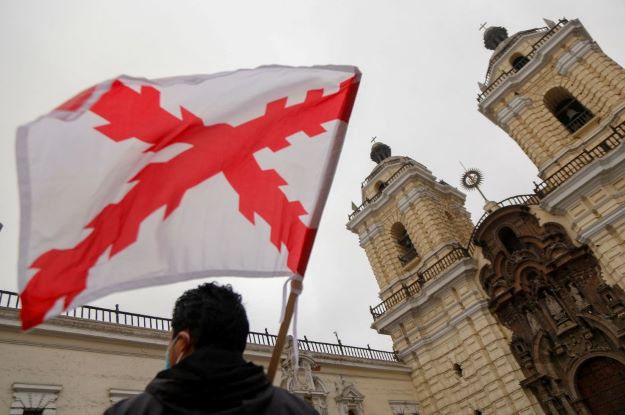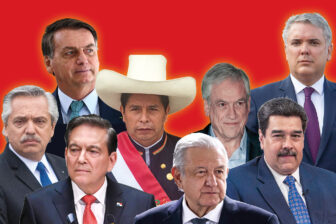Since June, Peruvians have been witnessing an unusual sight in the streets of Lima. Groups of people have been spotted bearing a flag with a little-known symbol called the Cross of Burgundy — it made its first appearance during post-election rallies against purported election fraud by current President Pedro Castillo and his party, Perú Libre. More recently, on October 12, which is both Spain’s “Día de la Hispanidad” and Peru’s Indigenous Peoples and Intercultural Dialogue Day, the Peruvian Patriot Society (Sociedad Patriota del Perú) carried the flag in front of the statue of Christopher Columbus in Lima’s historical center. The group claimed to be protecting the statue from demonstrators against the legacy of colonialism and violence perpetrated during the Spanish conquest against indigenous populations.
The Cross of Burgundy — a symbol that pays homage to the Spanish monarchy and to the “civilizational crusade” it carried out in its former colonies — is not a common image in Peruvian society or politics. Its sudden appearance has raised many eyebrows, especially considering how the legacy of colonization has been newly questioned and criticized in many Latin American countries in the last few years, including Peru. In 2019, Mexican president Andrés Manuel López Obrador caused a stir by sending letters to King Felipe VI of Spain and Pope Francis asking them to apologize for the atrocities committed against indigenous peoples during the conquest of the Americas. And at his swearing-in ceremony in July, Pedro Castillo promised to “break with colonial symbols” and criticized Spain’s exploitation of Peru’s mineral resources during the colonial period — in front of Spain’s King Felipe VI, who had attended the ceremony.
The sudden appearance of this symbol is indicative of a change within Peru’s right-wing parties: They are adopting a nationalist discourse that emphasizes the country’s Spanish heritage, Catholicism, and ties to the Iberian Peninsula. The leader of the conservative Fuerza Popular party, Keiko Fujimori, recently participated in Viva 21, an event held by Spanish far-right party Vox with the purpose of “enriching Spanish culture.” Fujimori called the event a “symbol of Hispanic unity against the socialism of the 21st century” and said that she shared their defense of life and family. Three congressmembers of Avanza País, the party of conservative economist Hernando de Soto, have signed the Carta de Madrid, a document sponsored by Vox that claims to unite the “Iberosphere” against the global communist threat. Another group of parliamentarians from Renovación Popular (led by Rafael López Aliaga) also met with Vox representatives in Lima in September.
This particular flavor of nationalism has had little influence in recent Peruvian history. In the 1970s, for example, General Velasco’s authoritarian regime — though strongly nationalistic — highlighted the nation’s Incan past and indigenous roots. The neoliberal economic policies implemented in the 1990s weakened many social movements, including political parties, eroding their capacity to build any type of strong, identity-based platform. The single defining belief within mainstream Peruvian parties has been a consensus that foreign investment, free trade, and open markets are the only acceptable recipe for growth and progress. A discourse of anticommunism was only to be expected after the election of the left-wing Castillo. More unexpected — and indicative of a process of radicalization — is the move on the Peruvian right beyond a defense of its economic model, framing its opposition to Castillo now as a more existential struggle for liberty and national identity.
The apparent rise of nationalism in Peru is not an isolated occurrence in Latin America and is more easily understood as part of a wave of far-right sentiment in the region. Supporters of this tendency argue they are pushing back against the threats of communism and indigenismo. Many prominent political figures, including Eduardo Bolsonaro, son of Brazilian president Jair Bolsonaro; former Colombian presidents Andrés Pastrana and Álvaro Uribe; and Chilean politician José Antonio Kast, have participated in events held by Vox, an undoubtedly racist, nativist and xenophobic party which is currently undertaking an effort to unite the more conservative sectors of Latin America in an offensive against “globalism” and the left.
Faced with Castillo’s presidency, the Peruvian right has decided to join this cultural movement. Conservative groups may be hoping to gain new voters with this new strategy, emulating Vox, which in the span of a few years went from a fringe group in Spanish politics to being the third-largest party in the Spanish Parliament. While their views are considered reprehensible by many, they have clearly resonated with a sector of the Spanish population, and it is likely that Peruvian right-wing parties are hoping to achieve a similar kind of success. Whether or not Keiko Fujimori and other politicians truly believe in the cultural legacy of Spain is not as important as their belief that saying so is a winning strategy — one they are likely to continue to pursue. Their decision to do so will continue to erode the foundations of Peru’s already shaky democracy.









